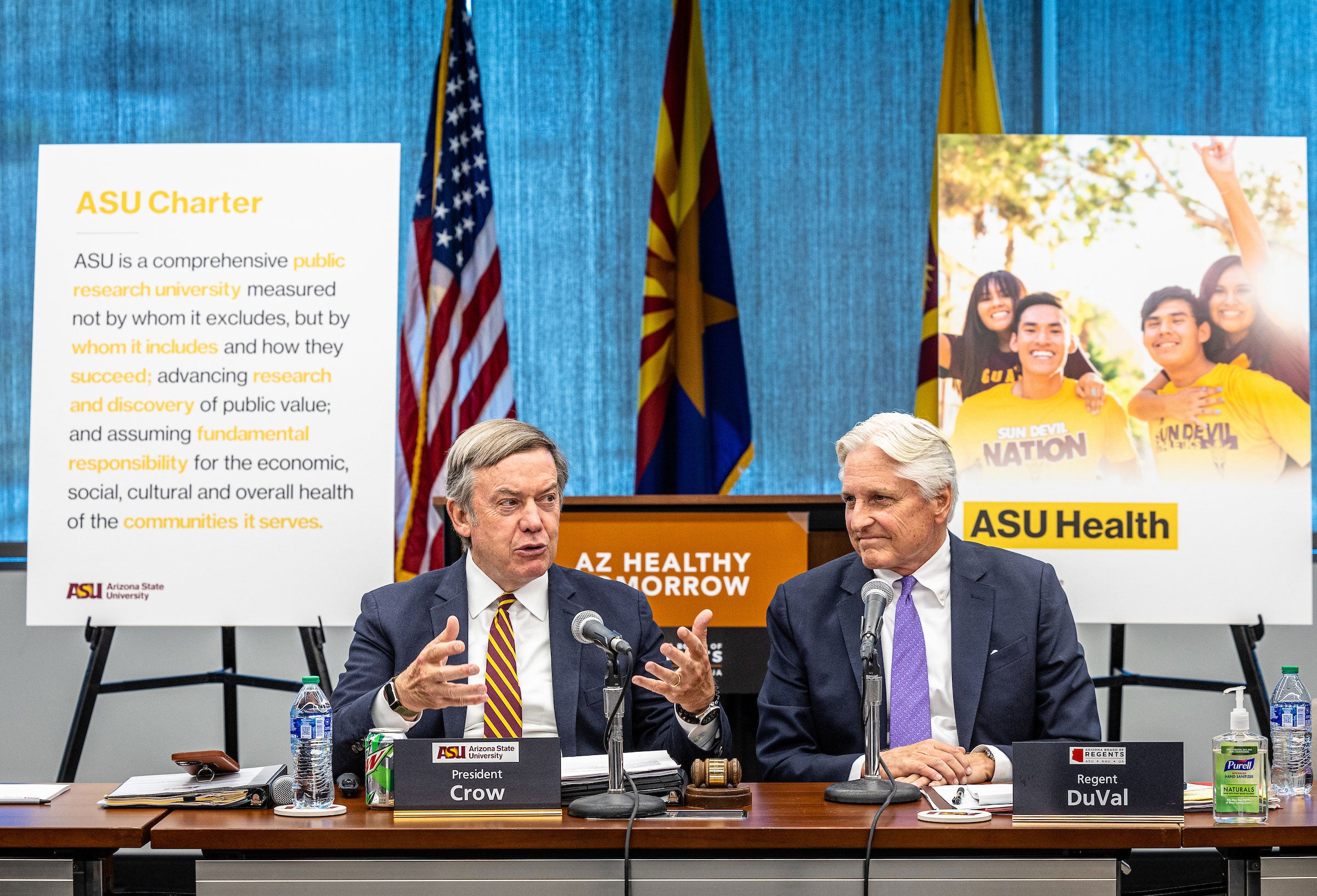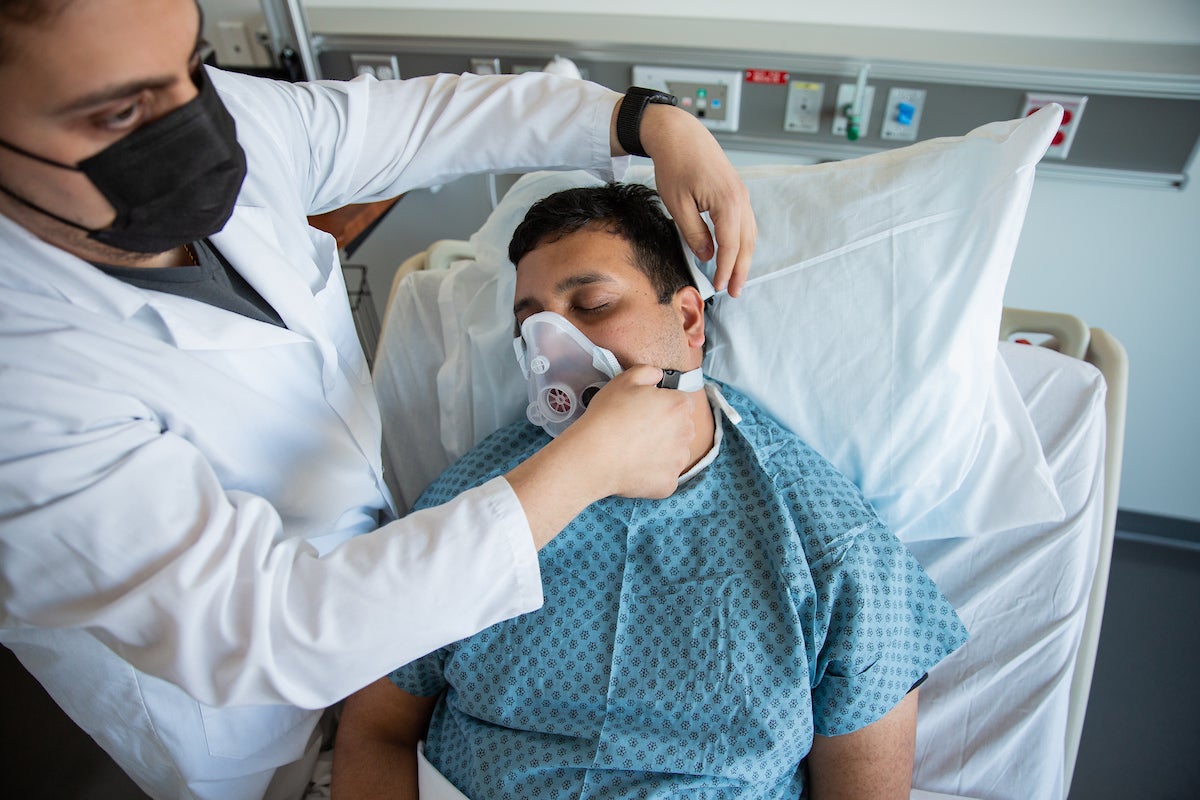Editor’s note: This story is featured in the 2023 year in review.
The Arizona Board of Regents has asked Arizona State University to expand medical education in Arizona by launching a new medical school, one charged with addressing the significant and growing health care needs of the state.
The new ASU School of Medicine and Advanced Medical Engineering will integrate clinical medicine, biomedical science and engineering, joining universities such as Texas A&M and the University of Illinois, among others, that have opened a different kind of medical school.
Fred DuVal, chair elect of the Arizona Board of Regents, said the move is an important step in the evolution of ASU and is part of a charge to the state’s entire university system to grow the state’s health care workforce.
“This is part of the most aggressive and comprehensive health care plan in Arizona’s history,” DuVal said. “It will include major growth and new investments by all three of our state universities, significant partnerships with the private sector, and the support of our government partners.”
Added ASU President Michael Crow, “We are focusing our full energy and innovation on improving Arizona’s health outcomes.
“We must generate knowledge at a scale that will impact society. Our university charter drives us to assume fundamental responsibility for the overall health of the communities we serve. This is an extension of that core belief.”
ASU President Michael Crow (left) and Fred DuVal, chair elect of the Arizona Board of Regents — in conjunction with the rest of the Arizona Board of Regents — announce the creation of ASU School of Medicine and Advanced Medical Engineering on Thursday on the Tempe campus. The new School, part of the new ASU Health, will integrate clinical medicine, biomedical science and engineering. Photo by Charlie Leight/ASU News
The new medical school headlines ASU Health, a “learning health ecosystem” being created by the university to accelerate and focus its health-related efforts to tackle the state’s urgent health care needs, now and into the future.
Unlike traditional medical schools, ASU’s new medical school will take a different approach.
Clinical partnerships will support both research and academic programs, delivering solutions that improve patient and health care outcomes.
“An interdisciplinary approach will bring together health sciences from across the university to prepare students to address complex health care problems,” said Nancy Gonzales, executive vice president and university provost.
A state in need
The need in Arizona is staggering. The state ranks near or in the bottom quartile of many health system performance indicators, including No. 32 overall, No. 44 in access and affordability and No. 41 in prevention and treatment.
The state’s steadily growing population only aggravates the problem, experts say, and Arizona faces a shortage in almost every health care profession. The state needs to add an estimated 14,000 more nurses — enough to nearly fill the Phoenix Suns basketball arena — just to reach the national average.
Public health funding is 50% below the national average, and Arizona has fewer hospital beds per 1,000 people than the national average. There already is significant turnover in health care professions, and experts say turnover rates for physicians and nurses will be impacted by approaching retirements in the next decade.
“We have an opportunity for change,” Crow said. “And over the past 20 years, ASU has shown that we know how to create transformative change, at scale.”
The state ranks near or in the bottom quartile of many health system performance indicators, and Arizona has fewer hospital beds per 1,000 people than the national average. The steadily growing population only aggravates the problem, experts say, and Arizona faces a shortage in almost every health care profession.
One part of a focused approach
More details will be discussed in coming months, but the new ASU Health effort will involve more than just the new medical school.
ASU will continue to work closely with health care partners across Maricopa County and across the country to bring top talent, technology and research to the effort to improve health outcomes in Arizona.
And ASU’s long-standing relationship with Mayo Clinic, known as the Mayo Clinic and Arizona State University Alliance for Health Care, will continue to expand through the ASU Health Futures Center next to Mayo Clinic's north Phoenix campus and the continued development of the Discovery Oasis innovation zone next to the Mayo Clinic Phoenix Hospital.
“As two organizations committed to innovation, Mayo Clinic and Arizona State University have enjoyed strong and authentic collaborations for more than two decades, including the Mayo Clinic and ASU Alliance for Health Care,” said Dr. Richard Gray, CEO of Mayo Clinic. “Biomedical education students at Mayo Clinic Alix School of Medicine have benefited from dual-degree graduate education opportunities at ASU and we have many joint research initiatives.
“It is our shared vision that Arizona should play a leading role in advancing health care through the development of a collaborative biotech ecosystem. We support and commend ASU for its leadership in medical bioengineering and look forward to growth in medical education within our state. Arizonans will benefit from the addition of more physicians.”
Learn more at health.asu.edu.
More Health and medicine

New research indicates effects of PTSD on body vary by culture
According to the World Health Organization, about 3.9% of the world's population has had post-traumatic stress disorder at some point during their lives. That number is higher in the United States,…

Human-centered technology embraced at ASU Digital Health Summit
Digital health technology is advancing at lightning speed, but the innovation requires a human touch to ensure that everyone benefits from the advances, according to speakers at the inaugural ASU…

Ancient DNA could help to understand recent tuberculosis outbreak in Kansas
For over a year, Wyandotte and Johnson counties in Kansas City, Kansas, have been fighting an outbreak of tuberculosis (TB) that has claimed two lives and infected nearly 150 residents. The…


